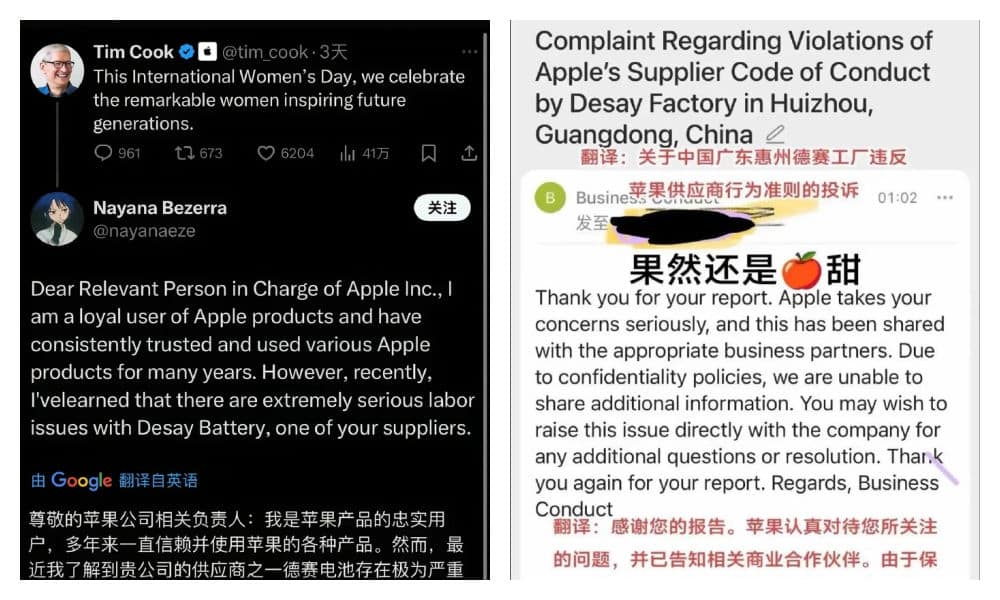China Digital
Too Sexy for Weibo? Online Discussions on the Concept of ‘Cābiān’
Delving into the ongoing discussion on ‘cābiān’ and its influence on women’s expression in China’s digital realm.
Published
1 year agoon
By
Ruixin Zhang
Chinese social media is seeing more discussions recenty on the blurred boundaries of Cābiān. This seemingly never-ending discussion raises questions – not just about sexually suggestive content, but also about the evolving perceptions of women’s bodies and freedom in the digital age.
In the fast-moving world of China’s internet, a new term has emerged: Cābiān (擦边). Originally a sports term describing a ball grazing the edge of a table (擦边球), it now primarily refers to the delicate balance in content that may be seen as sexually suggestive, teetering on the line between ‘sexy’ and ‘sexually explicit’ in the context of China’s internet culture.
The term mainly refers to women’s behavior, style, language, and actions that are considered inappropriate or that are pushing the boundaries of acceptability. Cābiān can be understood as borderline sexual content that basically navigates the boundaries of platform rules without actually breaking them. Nevertheless, is generally seen as ‘not in line’ with what is expected of Chinese women in today’s society.
This term has sparked controversy recently, prompting fervent debates surrounding its implications for women’s self-expression.
Too Sexy for Weibo? Jingchuan Liyu’s Divisive Pictures
Social media plays a central role in the “cābiān” debate. A recent example involves a Weibo post by Jingchuan Liyu (井川里予, @悲伤荷包蛋), a prominent Chinese influencer active on Weibo and Xiaohongshu.
Jingchuan Liyu is known for embodying both innocence and sensuality in her online persona. Mainly by male netizens, she has been labeled as a symbol of “chúnyù” (纯欲). This term signifies a blend of childlike innocence (纯洁, chúnjié) and allure (欲望, yùwàng).
Jingchuan Liyu became a focal point in the cābiān debate when she posted a series of photos during the summer of this year. While these photos didn’t violate any official guidelines, they departed from her typical “innocent yet sexy” style. In these pictures, she was seen wearing thongs and other undergarments, which apparently made some social media users uneasy.

The controversy surrounding the photos intensified when Jingchuan Liyu responded to these criticisms on her Weibo page. While her supporters defended her freedom to dress as she pleases, others viewed her photos as being more about provocative sexual suggestion than about freedom of fashion.
Dog-Headed Lolita: Judged, Harassed, and Labeled Cābiān
Beyond online debates, the condemnation of “cābiān” is also having real-world consequences. One recent example is the case of the Chinese influencer known as Dog-Head Lolita (狗头萝莉 @我是狗头萝莉).
Despite having a problematic childhood, ‘Dog-Head Lolita’ managed to turn her life around and became a successful streamer. But her reputation suffered a severe blow when explicit videos of her, recorded by her ex-boyfriend, were made public.
This incident and its aftermath damaged her career and, partly due to getting cheated by her manager, was left with a staggering debt of 6 million RMB ($836K). Trying to start an alternative career, Dog-Head Lolita took up selling Chinese pancakes (jiānbǐng 煎饼) at a street stall as a means to make a living and work towards repaying her debts.
In addition to her physical labor, she also posted short videos of herself selling pancakes online and continued to livestream and engage with her followers to generate more income.
While her efforts garnered sympathy and admiration from some netizens, she also faced accusations of using her pancake-selling business as a form of cābiān.

Her choice of attire, which emphasized her figure, became a central topic of discussion. Some netizens raised questions about whether her videos, showcasing her interactions with fans while selling pancakes, carried a sexual undertone. Moreover, there were arguments suggesting that her true business wasn’t selling pancakes but rather producing sexually suggestive content.

Some critics of Dog-Head Lolita went further and turned online criticism into harassment. Some filed reports regarding the hygiene conditions of her business, while others intentionally vandalized her pancake cart and left insulting messages on it.
Facing this harassment linked to accusations of being cābiān, Dog-Head Lolita voiced her frustration on her Weibo page.
She emphasized that her physique was something beyond her control and that selling pancakes shouldn’t be judged in the same way as her previous online presence. She complained that her livelihood was being scrutinized, even in the most ordinary and innocuous settings.
Challenging the Concept of Cābiān
Defining the precise boundaries of what is and is not cābiān is not easy, as it has become a catch-all term for anything remotely sexually suggestive, erotic, or resembling “soft pornography.”
While the distinction between suggestive and non-suggestive content remains hazy, new voices have emerged to challenge the very idea of “cābiān.”
Some believe that cābiān is a societal construct imposed on women, rather than an intrinsic concept. They argue that before the term “cābiān” gained popularity, suggestive pelvic dances were widespread in China due to the prevalence of K-pop boy groups, and male celebrities could appear shirtless and flirtatious on TV without anyone accusing them of “cābiān.”
But when it comes to women, the standards of cābiān can be unclear and are often unforgiving. This term is used not only to regulate their clothing choices but also their behavior or even facial expressions—essentially, anything a woman might do.
Once a female online influencer is seen as attractive and desireable, she seemingly becomes more prone to be labeled a “cābiān nǚ” (擦边女) – a woman who is seen as flaunting her sensuality within the context of social media and online platforms.
If this trend of labeling people as sexually suggestive continues, “cābiān” might turn into an unclear social rule, resulting in ongoing moral judgments of women, especially female online influencers.
On the other hand, some netizens see the increasing acceptance of women displaying their bodies in a sensual manner as a form of female empowerment.
One notable Weibo by ‘Wang’ede’ (@王饿德) post that gained a lot of attention suggested that there is a distinction between how others interpret women’s bodies and how women themselves perceive it. The post asserts that revealing skin and wearing “sexy” clothing can be a proactive expression of women’s own desires and confidence rather than solely meaning to please a male audience.
This active pursuit is seen as a form of ‘decolonization’ of the traditional patriarchal gaze— it’s described as “a reevaluation of women’s bodies by women themselves that allows us to reclaim ownership of our bodies,” as stated by the author of the post.
Neverending Discussions
As the debates continue, Weibo users are noticing a deadlock in these online discussions. Conversations about the who, what, and why of cābiān are recurring and appear to be never-ending.
In 2019, a significant debate arose concerning the attire worn by actress Rayzha Alimjan. In 2022, controversies revolved around busty women. There was also a cyberbullying incident involving a mother who had recently lost her son in a car accident and faced criticism for wearing elegant clothing and makeup (read). Most recently, there has been a series of new discussions, ranging from criticizing the latest TV drama starring singer/actress Lai Meiyun and onwards.
Contemplating this phenomenon, some internet users are thinking about the evolution of Jingchuan Liyu’s style. A decade or two ago, her aesthetic might have been categorized as ’emo,’ ‘alternative,’ or just seen as a form of decadent beauty. However, nowadays, it is quickly subjected to examination to determine whether or not it falls into the category of cābiān.
In the eyes of many Chinese netizens, this trend is seen as a discouraging step backward. Influential bloggers repost their previous cābiān-related Weibo posts from years or even just months ago, highlighting the seemingly futile nature of these discussions.
Who will be the next woman to be branded as cābiān? Will she face online insults and offline harassment? On Weibo, some express their exhaustion at being stuck in this repetitive loop, engaging in similar debates time and time again.
Perhaps it is time to reevaluate the term “cābiān” and engage in more meaningful discussions about women’s bodies and their freedom in China. As one netizen put it on Weibo: “Maybe we should redirect this energy toward discussions that genuinely promote progress instead of endlessly revisiting these cyclic debates.”
By Ruixin Zhang
edited for clarity by Zilan Qian & Manya Koetse
Get the story behind the hashtag. Subscribe to What’s on Weibo here to receive our newsletter and get access to our latest articles:
Spotted a mistake or want to add something? Please let us know in comments below or email us. First-time commenters, please be patient – we will have to manually approve your comment before it appears.
©2023 Whatsonweibo. All rights reserved. Do not reproduce our content without permission – you can contact us at info@whatsonweibo.com.
Ruixin is a Leiden University graduate, specializing in China and Tibetan Studies. As a cultural researcher familiar with both sides of the 'firewall', she enjoys explaining the complexities of the Chinese internet to others.

China Arts & Entertainment
How K-pop Fans and the 13-Year-Old Daughter of Baidu VP Sparked a Debate on Online Privacy
What began as K-pop fan outrage targeting a snarky commenter quickly escalated into a Baidu-linked scandal and a broader conversation about data privacy on Chinese social media.
Published
3 days agoon
March 26, 2025By
Ruixin Zhang
For an ordinary person with just a few followers, a Weibo account can sometimes be like a refuge from real life—almost like a private space on a public platform—where, along with millions of others, they can express dissatisfaction about daily annoyances or vent frustration about personal life situations.
But over recent years, even the most ordinary social media users could become victims of “opening the box” (开盒 kāihé)—the Chinese internet term for doxxing, meaning the deliberate leaking of personal information to expose or harass someone online.
A K-pop Fan-Led Online Witch Hunt
On March 12, a Chinese social media account focusing on K-pop content, Yuanqi Taopu Xuanshou (@元气桃浦选手), posted about Jang Wonyoung, a popular member of the Korean girl group IVE. As the South Korean singer and model attended Paris Fashion Week and then flew back the same day, the account suggested she was on a “crazy schedule.”
In the comment section, one female Weibo user nicknamed “Charihe” replied:
💬 “It’s a 12-hour flight and it’s not like she’s flying the plane herself. Isn’t sleeping in business class considered resting? Who says she can’t rest? What are you actually talking about by calling this a ‘crazy schedule’..”

Although the comment may have come across as a bit snarky, it was generally lighthearted and harmless. Yet unexpectedly, it brought disaster upon her.
That very evening, the woman nicknamed Charihe was bombarded with direct messages filled with insults from fans of Jang Wonyoung and IVE.
Ironically, Charihe’s profile showed she was anything but a hater of the pop star—her Weibo page included multiple posts praising Wonyoung’s beauty and charm. But that context was ignored by overzealous fans, who combed through her social media accounts looking for other posts to criticize, framing her as a terrible person.
After discovering through Charihe’s account that she was pregnant, Jang Wonyoung’s fans escalated their attacks by targeting her unborn child with insults.
The harassment did not stop there. Around midnight, fans doxxed Charihe, exposing her personal information, workplace, and the contact details of her family and friends. Her friends were flooded with messages, and some were even targeted at their workplaces.
Then, they tracked down Charihe’s husband’s WeChat account, sent him screenshots of her posts, and encouraged him to “physically punish” her.
The extremity of the online harassment finally drew backlash from netizens, who expressed concern for this ordinary pregnant woman’s situation:
💬 “Her entire life was exposed to people she never wanted to know about.”
💬 “Suffering this kind of attack during pregnancy is truly an undeserved disaster.”
Despite condemnation of the hate, some extreme self-proclaimed “fans” remained relentless in the online witch hunt against Charihe.
Baidu Takes a Hit After VP’s 13-Year-Old Daughter Is Exposed
One female fan, nicknamed “YourEyes” (@你的眼眸是世界上最小的湖泊), soon started doxxing commenters who had defended her. The speed and efficiency of these attacks left many stunned at just how easy it apparently is to trace social media users and doxx them.
Digging into old Weibo posts from the “YourEyes” account, people found she had repeatedly doxxed people on social media since last year, using various alt accounts.
She had previously also shared information claiming to study in Canada and boasted about her father’s monthly salary of 220,000 RMB (approx. $30.3K), along with a photo of a confirmation document.
Piecing together the clues, online sleuths finally identified her as the daughter of Xie Guangjun (谢广军), Vice President of Baidu.
From an online hate campaign against an innocent, snarky commenter, the case then became a headline in Chinese state media, and even made international headlines, after it was confirmed that the user “YourEyes”—who had been so quick to dig up others’ personal details—was in fact the 13-year-old daughter of Xie Guangjun, vice president at one of China’s biggest tech giants.
On March 17, Xie Guangjun posted the following apology to his WeChat Moments:

💬 “Recently, my 13-year-old daughter got into an online dispute. Losing control of her emotions, she published other people’s private information from overseas social platforms onto her own account. This led to her own personal information also getting exposed, triggering widespread negative discussion.
As her father, I failed to detect the problem in time and failed to guide her in how to properly handle the situation. I did not teach her the importance of respecting and protecting the privacy of others and of herself, for which I feel deep regret.
In response to this incident, I have communicated with my daughter and sternly criticized her actions. I hereby sincerely apologize to all friends affected.
As a minor, my daughter’s emotional and cognitive maturity is still developing. In a moment of impulsiveness, she made a wrong decision that hurt others and, at the same time, found herself caught in a storm of controversy that has subjected her to pressure and distress far beyond her age.
Here, I respectfully ask everyone to stop spreading related content and to give her the opportunity to correct her mistakes and grow.
Once again, I extend my apologies, and I sincerely thank everyone for your understanding and kindness.”
The public response to Xie’s apology has been largely negative. Many criticized the fact that it was posted privately on WeChat Moments rather than shared on a public platform like Weibo. Some dismissed the statement as an attempt to pacify Baidu shareholders and colleagues rather than take real accountability.
Netizens also pointed out that the apology avoided addressing the core issue of doxxing. Concerns were raised about whether Xie’s position at Baidu—and potential access to sensitive information—may have helped his daughter acquire the data she used to doxx others.
Adding fuel to the speculation were past conversations allegedly involving one of @YourEyes’ alt accounts. In one exchange, when asked “Who are you doxxing next?” she replied, “My parents provided the info,” with a friend adding, “The Baidu database can doxx your entire family.”
Following an internal investigation, Baidu’s head of security, Chen Yang (陈洋), stated on the company’s internal forum that Xie Guangjun’s daughter did not obtain data from Baidu but from “overseas sources.”
However, this clarification did little to reassure the public—and Baidu’s reputation has taken a hit. The company has faced prior scandals, most notably a the 2016 controversy over profiting from misleading medical advertisements.
Online Vulnerability
Beyond Baidu’s involvement, the incident reignited wider concerns about online privacy in China. “Even if it didn’t come from Baidu,” one user wrote, “the fact that a 13-year-old can access such personal information about strangers is terrifying.”
Using the hashtag “Reporter buys own confidential data” (#记者买到了自己的秘密#), Chinese media outlet Southern Metropolis Daily (@南方都市报) recently reported that China’s gray market for personal data has grown significantly. For just 300 RMB ($41), their journalist was able to purchase their own household registration data.
Further investigation uncovered underground networks that claim to cooperate with police, offering a “70-30 profit split” on data transactions.
These illegal data practices are not just connected to doxxing but also to widespread online fraud.
In response, some netizens have begun sharing guides on how to protect oneself from doxxing. For example, they recommend people disable phone number search on apps like WeChat and Alipay, hide their real name in settings, and avoid adding strangers, especially if they are active in fan communities.
Amid the chaos, K-pop fan wars continue to rage online. But some voices—such as influencer Jingzai (@一个特别虚荣的人)—have pointed out that the real issue isn’t fandom, but the deeper problem of data security.
💬 “You should question Baidu, question the telecom giants, question the government, and only then, fight over which fan group started this.”
As for ‘Charihe,’ whose comment sparked it all—her account is now gone. Her username has become a hashtag. For some, it’s still a target for online abuse. For others, it is a reminder of just how vulnerable every user is in a world where digital privacy is far from guaranteed.
By Ruixin Zhang
Independently covering digital China for over a decade. Like what we do? Support us and get the story behind the hashtag by subscribing:
edited for clarity by Manya Koetse
Spotted a mistake or want to add something? Please let us know in comments below or email us. First-time commenters, please be patient – we will have to manually approve your comment before it appears.
©2024 Whatsonweibo. All rights reserved. Do not reproduce our content without permission – you can contact us at info@whatsonweibo.com.
China Digital
Chinese Netizens Turn to Tim Cook Over Battery Factory’s Illegal Overtime
Is turning to Western suppliers an effective way for workers to pressure domestic companies into complying with labor laws?
Published
1 week agoon
March 20, 2025
We include this content in the Weibo Watch newsletter. Subscribe to get it in your inbox 📩
Recently, Chinese netizens have started reaching out to Apple and its CEO Tim Cook in order to put pressure on a state-owned battery factory accused of violating labor laws.
The controversy involves the Huizhou factory of Desay Battery (德赛电池), known for producing lithium batteries for the high-end smartphone market, including Apple and Samsung. The factory caught netizens’ attention after a worker exposed in a video that his superiors were deducting three days of wages because he worked an 8-hour shift instead of the company’s “mandatory 10-hour on-duty.” Compulsory overtime violates China’s labor laws.
In response, the worker and other netizens started to let Apple know about the situation through email and social media, trying to put pressure on the factory by highlighting its position in the Apple supply chain. In at least one instance, Apple confirmed receipt of the complaint. (Meanwhile, on Tim Cook’s official Weibo account, the comment section underneath his most recent post is clearly being censored.)

Screenshot of replies on X underneath a post by Tim Cook on International Women’s Day.
The factory, however, has denied the allegations, , claiming that the video creator was spreading untruths and that they had reported him to authorities. His content has since also been removed. A staff member at Desay Battery maintained that they adhere to the 8-hour workday and appropriately compensate workers for overtime.
At the same time, Desay Battery issued an official statement, admitting to “management oversights regarding employee rights protection” (“保障员工权益的管理上存在疏漏”) and promising to do better in safeguarding employee rights.
One NetEase account (大风文字) suggested that for Chinese workers to effectively expose labor violations, reporting them to Western suppliers or EU regulators is an effective way to force domestic companies to respect labor laws.
Another commentary channel (上峰视点) was less optimistic about the effectiveness, arguing that companies like Apple would be quick to drop suppliers over product quality issues but more willing to turn a blind eye to labor violations—since cheap labor remains a key competitive advantage in Chinese manufacturing.
By Manya Koetse
(follow on X, LinkedIn, or Instagram)
Spotted a mistake or want to add something? Please let us know in comments below or email us. First-time commenters, please be patient – we will have to manually approve your comment before it appears.
©2025 Whatsonweibo. All rights reserved. Do not reproduce our content without permission – you can contact us at info@whatsonweibo.com.
Subscribe

How K-pop Fans and the 13-Year-Old Daughter of Baidu VP Sparked a Debate on Online Privacy

Squat or Sit? China’s Great Toilet Debate and the Problem of Footprints on the Seat

Weibo Watch: The Great Squat vs Sitting Toilet Debate in China🧻

Chinese Netizens Turn to Tim Cook Over Battery Factory’s Illegal Overtime

Revisiting China’s Most Viral Resignation Letter: “The World Is So Big, I Want to Go and See It”

Our Picks: Top 10 Chinese Buzzwords and Phrases of 2024 Explained

“Dear Li Hua”: The TikTok/Xiaohongshu Honeymoon Explained

Beyond the Box Office: What’s Behind Ne Zha 2’s Success?

Weibo Watch: Christmas in China Is Everywhere and Nowhere

Weibo Watch: A New Chapter

15 Years of Weibo: The Evolution of China’s Social Media Giant

Tuning Into the Year of the Snake

The ‘China-chic Girl’ Image and the Realities of China’s Competitive Food Delivery Market

TikTok Refugees, Xiaohongshu, and the Letters from Li Hua

“Black Myth: Wukong”: From Gaming Screens to the CMG Spring Festival Gala?
Get in touch
Would you like to become a contributor, or do you have any tips or suggestions? Get in touch here!
Popular Reads
-

 China Insight11 months ago
China Insight11 months agoThe Tragic Story of “Fat Cat”: How a Chinese Gamer’s Suicide Went Viral
-

 China Music12 months ago
China Music12 months agoThe Chinese Viral TikTok Song Explained (No, It’s Not About Samsung)
-

 China Digital10 months ago
China Digital10 months agoChina’s 2024 Gaokao Triggers Online Discussions on AI
-

 China Arts & Entertainment11 months ago
China Arts & Entertainment11 months agoSinging Competition or Patriotic Fight? Hunan TV’s ‘Singer 2024’ Stirs Nationalistic Sentiments




